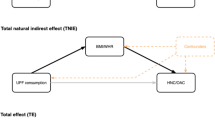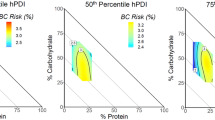Abstract
Purpose
There is existing evidence on the potential role of chronic inflammation in the pathogenesis of pancreatic cancer (PC) and on how risk may be modulated by dietary factors. Pro-inflammatory diets are suggested to be associated with increased risk of PC but, so far, evidence remains not conclusive. We examined the association between the dietary inflammatory potential and PC risk within the European Prospective Investigation into Cancer and Nutrition (EPIC) study, which includes 450,112 participants.
Methods
After a 14-year follow-up, a total of 1239 incident PC cases were included in this study. The inflammatory potential of the diet was estimated using an Inflammatory Score of the Diet (ISD). Hazard ratios (HRs) and 95% confidence intervals (CIs) for the association between the ISD and PC were estimated using multivariable Cox regression models, adjusted for known risk factors for PC.
Results
Participants with higher ISDs had a higher risk of developing PCs. In the fully adjusted multivariate model, the risk of PC increased by 11% (HR 1.11, 95% CI 1.02–1.22) for 1 point each standard deviation increase in the ISD score. Neither obesity nor any other known risk factor for PC showed statistically significant interactions.
Conclusion
To the best of our knowledge, this is the first prospective study reporting a positive relationship between the inflammatory potential of diet and PC. Since early diagnosis and treatment of pancreatic cancer might be challenging, prevention remains the major hope for reducing the burden of this disease.
Similar content being viewed by others
Data availability
Author elects to not share data.
References
Bray F, Ferlay J, Soerjomataram I, Siegel RL, Torre LA, Jemal A (2018) Global cancer statistics 2018: GLOBOCAN estimates of incidence and mortality worldwide for 36 cancers in 185 countries. CA Cancer J Clin 68(6):394–424. https://doi.org/10.3322/caac.21492
World Cancer Research Fund/American Institute for Cancer Research (2018) Diet, nutrition, physical activity and cancer: a global perspective. Contin Updat Proj Expert Rep 15(136):E359–E386
Rawla P, Sunkara T, Gaduputi V (2019) Epidemiology of pancreatic cancer: global trends, etiology and risk factors. World J Oncol 10(1):10–27. https://doi.org/10.14740/wjon1166
Maisonneuve P (2019) Epidemiology and burden of pancreatic cancer. Presse Med 48(3 Pt 2):e113–e123. https://doi.org/10.1016/j.lpm.2019.02.030
Herder C, Peltonen M, Koenig W et al (2009) Anti-inflammatory effect of lifestyle changes in the Finnish diabetes prevention study. Diabetologia 52:433–442. https://doi.org/10.1007/s00125-008-1243-1
Hamer M, Sabia S, Batty GD et al (2012) Physical activity and inflammatory markers over 10 years: follow-up in men and women from the Whitehall II cohort study. Circulation 126:928–933. https://doi.org/10.1161/CIRCULATIONAHA.112.103879
Galland L (2010) Diet and inflammation. Nutr Clin Pract 25(6):634–640. https://doi.org/10.1177/0884533610385703
Agudo A, Cayssials V, Bonet C et al (2018) Inflammatory potential of the diet and risk of gastric cancer in the European prospective investigation into cancer. Am J Clin Nutr 107(4):607–616. https://doi.org/10.1093/ajcn/nqy002
Jakszyn P, Cayssials V, Buckland G et al (2020) Inflammatory potential of the diet and risk of colorectal cancer in the European prospective investigation into cancer and nutrition (EPIC) study. Int J Cancer 147(4):1027–1039. https://doi.org/10.1002/ijc.32870
Shivappa N, Bosetti C, Zucchetto A et al (2015) Dietary inflammatory index and risk of pancreatic cancer in an Italian case-control study. Br J Nutr 113(2):292–298. https://doi.org/10.1017/S0007114514003626
Antwi SO, Oberg AL, Shivappa N et al (2016) Pancreatic cancer: associations of inflammatory potential of diet, cigarette smoking and long-standing diabetes. Carcinogenesis 37(5):481–490. https://doi.org/10.1093/carcin/bgw022
Antwi SO, Bamlet WR, Pedersen KS et al (2018) Pancreatic cancer risk is modulated by inflammatory potential of diet and ABO genotype: a consortia-based evaluation and replication study. Carcinogenesis 39(8):1056–1067. https://doi.org/10.1093/carcin/bgy072
Zheng J, Wirth MD, Merchant AT et al (2019) Inflammatory potential of diet, inflammation-related lifestyle factors, and risk of pancreatic cancer: results from the NIH-AARP diet and health study. Cancer Epidemiol Biomark Prev 28(7):1266–1270. https://doi.org/10.1158/1055-9965.EPI-19-0250
Zheng J, Merchant AT, Wirth MD et al (2018) Inflammatory potential of diet and risk of pancreatic cancer in the prostate, lung, colorectal and ovarian (PLCO) cancer screening trial. Int J Cancer 142(12):2461–2470. https://doi.org/10.1002/ijc.31271
Hémon B, Casagrande C, Vignat J et al (2002) European prospective investigation into cancer and nutrition (EPIC): study populations and data collection. Public Health Nutr 5:1113–1124. https://doi.org/10.1079/PHN2002394
Margetts B, Pietinen P (1997) European prospective investigation into cancer and nutrition: validity studies on dietary assessment methods. Int J Epidemiol 26:S1–S5. https://doi.org/10.1093/ije/26.suppl_1.S1
World Health Organization (2004) ICD-10: international statistical classification of diseases and related health problems: tenth revision, 2nd ed. World Health Organization. https://apps.who.int/iris/handle/10665/42980.
Shivappa N, Steck SE, Hurley TG et al (2014) Designing and developing a literature-derived, population-based dietary inflammatory index. Public Health Nutr 17:1689–1696. https://doi.org/10.1017/S1368980013002115
Ferrari P, Day NE, Boshuizen HC et al (2008) The evaluation of the diet/disease relation in the EPIC study: considerations for the calibration and the disease models. Int J Epidemiol 37(2):368–378. https://doi.org/10.1093/ije/dym242
Lu PY, Shu L, Shen SS et al (2017) Dietary patterns and pancreatic cancer risk: a meta-analysis. Nutrients 9(1):38. https://doi.org/10.3390/nu9010038
Greer JB, Whitcomb DC (2009) Inflammation and pancreatic cancer: an evidence-based review. Curr Opin Pharmaco 9(4):411–418. https://doi.org/10.1016/j.coph.2009.06.011
Molina-Montes E, Sánchez MJ, Buckland G et al (2017) Mediterranean diet and risk of pancreatic cancer in the European prospective investigation into cancer and nutrition cohort. BR J Cancer 116(6):811–820. https://doi.org/10.1038/bjc.2017.14
Naudin S, Viallon V, Hashim D et al (2020) Healthy lifestyle and the risk of pancreatic cancer in the EPIC study. Eur J Epidemiol 35(10):975–986. https://doi.org/10.1007/s10654-019-00559-6
Ramallal R, Toledo E, Martínez-González MA et al (2017) Inflammatory potential of diet, weight gain, and incidence of overweight/obesity: the SUN cohort. Obesity (Silver Spring) 25(6):997–1005. https://doi.org/10.1002/oby.21833
Doyle SL, Donohoe CL, Lysaght J et al (2012) Symposium 3: obesity-related cancers visceral obesity, metabolic syndrome, insulin resistance and cancer. Proc Nutr Soc 71(1):181–189. https://doi.org/10.1017/S002966511100320X
Turnbaugh PJ, Ley RE, Mahowald MA et al (2006) An obesity-associated gut microbiome with increased capacity for energy harvest. Nature 444(7122):1027–1031. https://doi.org/10.1038/nature05414
Wirth MD, Hébert JR, Net S, al, (2016) Anti-inflammatory dietary inflammatory index scores are associated with healthier scores on other dietary indices. Nutr Res 36(3):214–219. https://doi.org/10.1016/j.nutres.2015.11.009
Funding
This work was funded by Instituto de Salud Carlos III through the project PI15/00639 (Co-funded by European Regional Development Fund [ERDF], a way to build Europe). We thank CERCA Programme/Generalitat de Catalunya for institutional support. The coordination of EPIC is financially supported by the European Commission (DG-SANCO) and the International Agency for Research on Cancer. The national cohorts are supported by the Danish Cancer Society (Denmark); Ligue Contre le Cancer, Institut Gustave Roussy, Mutuelle Générale de l’Education Nationale, Institut National de la Santé et de la Recherche Médicale (INSERM) (France); German Cancer Aid, German Cancer Research Center (DKFZ), Federal Ministry of Education and Research (BMBF), Deutsche Krebshilfe, Deutsches Krebsforschungszentrum and Federal Ministry of Education and Research (Germany); The Hellenic Health Foundation (Greece); Associazione Italiana per la Ricerca sul Cancro-AIRC-Italy and National Research Council (Italy); Dutch Ministry of Public Health, Welfare and Sports (VWS), Netherlands Cancer Registry (NKR), LK Research Funds, Dutch Prevention Funds, Dutch ZON (Zorg Onderzoek Nederland), World Cancer Research Fund (WCRF), Statistics Netherlands (The Netherlands); Nordic Centre of Excellence programme on Food, Nutrition and Health (Norway); Health Research Fund (FIS)-Instituto de Salud Carlos III (ISCIII), Regional Governments of Andalucía, Asturias, Basque Country, Murcia and Navarra, and the Catalan Institute of Oncology-ICO (Spain); Swedish Cancer Society, Swedish Research Council and County Councils of Skåne and Västerbotten (Sweden); Cancer Research UK (14136 to EPIC-Norfolk; C570/A16491 and C8221/A19170 and A29017 to EPIC-Oxford), to EPIC-Oxford), Medical Research Council (1000143 to EPIC-Norfolk, MR/M012190/1 to EPIC-Oxford) (United Kingdom). We also thank Aarhus and Oxford centres for their participation. The funders of this study were not involved in the processes of analysis or interpretation of the data; nor did they play any role in the preparation, review or approval of the manuscript.
Author information
Authors and Affiliations
Corresponding authors
Ethics declarations
Conflict of interest
The authors have declared no conflicts of interest.
Ethical approval
All participants have signed a written informed consent (Ethical approval number PR102/15).
Supplementary Information
Below is the link to the electronic supplementary material.
Rights and permissions
About this article
Cite this article
Cayssials, V., Buckland, G., Crous-Bou, M. et al. Inflammatory potential of diet and pancreatic cancer risk in the EPIC study. Eur J Nutr 61, 2313–2320 (2022). https://doi.org/10.1007/s00394-022-02809-y
Received:
Accepted:
Published:
Issue Date:
DOI: https://doi.org/10.1007/s00394-022-02809-y




